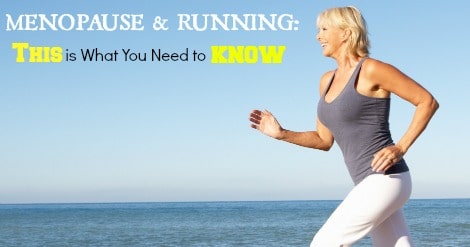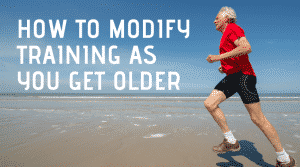There are some running related topics that come up over and over:
What should I eat before I run?
How do I get rid of a side stitch?
What can I do about my shin splints?
But there are other topics you wonder if you are even allowed to talk about them as they seem to be so taboo. Yet these are the things that need to be discussed.
To date, there hasn’t been much attention given to menopause/perimenopause and the impact on running.
Perhaps it is because the number of female masters runners was much smaller in previous decades. Or it could be that there just isn’t much research into this area.
Whatever the case, I think it’s time we bring it out on the table, don’t you?

[bctt tweet=”Female #Mastersrunners check this out, a post about menopause and how to handle it”]
Masters Running and Menopause
My friends and I—masters runners one and all—can tell you that we have felt some of the typical symptoms of approaching menopause.
From insomnia to moodiness to hot flashes, we’ve all enjoyed the fun that comes along with this unique time in life. We at least have each other to commiserate, so that helps!
The average age for reaching menopause, which is defined as the cessation of menses, is 51 in the United States.
When you take into account life expectancy rates into the 80s, most women spend a good third of their lives combined in menopause transition (MT), which can last up to 10 years; menopause; or post-menopause. That’s quite a lot of time spent dealing with the fall out from the changes.
Here’s the deal:
A big drop in estrogen production, which causes most of the symptoms, accompanies menopause. Typical symptoms include: skipped periods, hot flashes, insomnia, weight gain, urinary incontinence, and headaches. Some women also experience anxiety and signs of depression.
Clearly, for runners, losing restorative sleep, gaining weight, and potential incontinence are not desirable conditions.
Many physicians offer patients in this category hormone replacement therapy (HT), which has been shown to offset menopausal symptoms. HT is not without its own potential downsides, however, so many women choose to go the route of acupuncture or herbal medicine.
The best news is that exercise does seem to help alleviate some of menopause’s detrimental effects. A 2006 Finnish study by Kirsi Mansikkamaki, et al, found that “physically active women showed higher quality of life, when compared with to inactive women.”
Similarly, the “Exercise Prescription for the Menopausal Years” by Kimberly Perez, et al, recommended that women in this phase of life should implement a comprehensive exercise program that includes cardiovascular, resistance, flexibility and neuromuscular training. Taken in whole, these forms of exercise can reduce the impact that women would otherwise experience.
For runners, specifically, the biggest issue with which to be concerned is bone health, according to Jason Karp, PhD, and author of Women and Running. “Estrogen is the single biggest influencer of bone health, so when a woman loses estrogen, she loses the protective effect on bones,” he says. “A post-menopausal runner needs to do everything else she can to strengthen bones to avoid stress fractures.”
That said, there are several steps you can take to ensure bone health, including:
- Strength training—While running, a weight-bearing exercise, goes a long way toward promoting bone health, some studies suggest that resistance training is even more critical. If you aren’t already strength training twice a week, add it in now. It will also help offset the loss of muscle mass that occurs through menopause.
- Get your vitamin D levels tested regularly—If you are deficient, talk with your doctor about how to make that up through some form of supplementation. Vitamin D is crucial to calcium absorption.
- Eat a diet that includes multiple sources of calcium, including dark leafy green vegetables.
- Get short windows of time outside, sans sunscreen, to allow the sun to help with your vitamin D stores. After 10 to 15 minutes without sun protection, however, it’s time to slather it back on.
Conclusion
As to other symptoms of menopause that can impact your running life, lifestyle changes can help offset them. Earlier bed times or naps, if possible, can assist with occasional insomnia.
Exercising before it is terribly hot out in the summer, especially as we found masters runners are affected by the heat more—and wearing layers in the winter—can help with those hormonal temperature swings. And seeking out help via alternative therapies like acupuncture can also be beneficial.
What’s the bottom line?
Menopause and its fall out are quite real. Finding ways to minimize its impact are key and within reach with a concerted effort.
[bctt tweet=”Finally! A post about Menopause for Female Runners from @misszippy1 for @Runners_Connect” via=”no”]




8 Responses
Rather insulting picture, there are lots of menopausal women who are serious runners & don’t look like they’ve inadvertently broken into a run while walking the dog
Sorry you did not like the image Jo, but there are surprisingly few images of masters female runners out there for us to use. Maybe we need to get that taken care of 😉
I just got my menopause back after I been on treatment. Start at age 51 and I am 56.now I go and get my tablets at hosp been without it 2months so I think that my menopause was under control but I was wrong it hit me without any warning why did the menopause come back again it realy affect my relationship with my fiancee
Hi Rachel, sorry to hear about your struggles. The best person to ask about that would be your physician. All we can really do is give you suggestions on how to help you within your running. You may find some comfort in this podcast episode https://runnersconnect.net/running-interviews/running-tips-for-women/ but otherwise, it would be best to talk to your primary care doctor. Sorry we cannot be more help.
Thank you for any insight on fitness and menopause. It helps to know that others are feeling it too. 🙂
Happy to help Eileen! Any other topics you would like us to cover?
I have seen lots of debates about whether it is truly menopause or just age causing a decline in running ability in one’s 50’s. I went through surgically induced menopause at the age of 41, and the effects on running (as well as everything else, of course) were pretty much immediate. I went from a sub-3-hour marathon a few years prior to running 9 minute miles at best, especially in the heat. My summary: adjust your expectations during and after menopause! Maybe some women can remain competitive, but I am now trying to enjoy running for running’s sake rather than for the sake of competition.
Thanks for sharing Norah. Your experience will help other runners understand, we appreciate the feedback, and great advice!